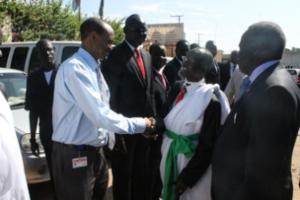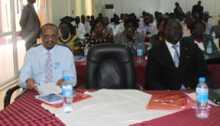World Health Organization supports Ministry of Health, Republic of South Sudan to develop National Malaria Strategic Plan, 2014 - 2020
A four day workshop to develop the South Sudan National Malaria Strategic Plan for the period 2014-2020 has opened in the Country’s State capital, Juba. The development of the strategic plan is a multi-sectoral activity that requires the participation of all partners with vested interests in malaria control in South Sudan. On its part, the World Health Organization (WHO) is providing Technical Assistance in the development of the Malaria strategy and facilitating the consultative process towards an all inclusive National Malaria Strategic Plan. The National malaria strategic development process is co-financed by WHO and a Global fund malaria grant.
The workshop was opened by the Vice-President of the Republic of South Sudan, The Right Hon Wani Igga. Speaking at the workshop, the Vice-President pledged support to the Health budget when tabled before cabinet. He appreciated the support of partners including WHO as the country fights malaria which accounts for 40% of all illnesses reported in South Sudan.
Dr Abdi Aden Mohammed, WHO Country Representative, said that over the past years, the Ministry of Health and health partners have achieved a remarkable progress in malaria control initiatives by distributing millions of mosquito nets; expanding access to early and reliable diagnosis from health facility to the community level; improving malaria diagnosis at all levels; strengthening the surveillance and training for health workers in various areas of the malaria programme. He said, “Malaria continues to threaten almost 40% of world population, and every year, millions of people suffer as a result of malaria and over a million children die from this disease. In South Sudan, malaria is the leading cause of morbidity and mortality, disproportionately affecting children and pregnant women”.
Dr Abdi also said that, despite the progress made, more malaria cases and deaths were registered in the last two years at facility and community level, and more needs to be done to interrupt local transmission in order reduce malaria cases.
Since the signing of the Comprehensive Peace Agreement in 2005, in line with the global malaria control strategy, the Ministry of Health (MoH) has endeavoured to scale up malaria control efforts in the country. In March 2012, the Republic of South Sudan (RSS) undertake an in-depth Malaria Programme Review (MPR), to assess progress towards achievement of national, regional and global targets and to review the current programme performance by intervention thematic areas and by service delivery levels in order to redefine the strategic direction for improved programme performance.
WHO has been working with the Ministry of Health and partners to expand the implementation of malaria control and prevention activities across the country, while building the capacity of malaria control programme at central and state levels. WHO is very committed to support and work with the Ministry of Health to expand the accessibility and availability of malaria diagnosis and treatment at all levels.
Once complete, this will be the first National Malaria Strategic Plan developed under South Sudan as a new and independent country. The National Malaria strategic development process is co-financed by Global fund Malaria grant and WHO




